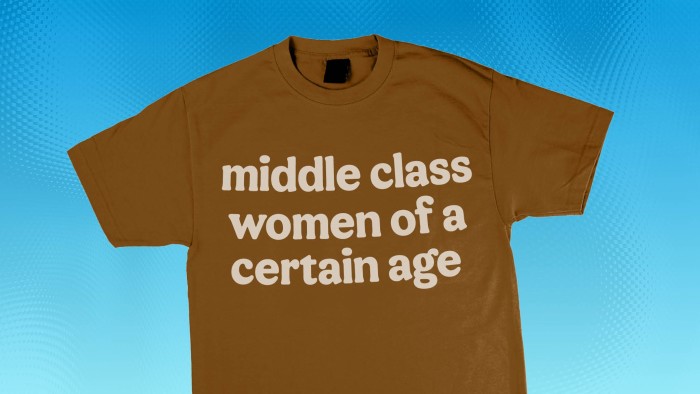Don’t mess with the women of a certain age

Stay informed with free updates
Simply sign up to the Life & Arts myFT Digest — delivered directly to your inbox.
My new sweatshirt has arrived. It’s mouse brown, the colour of invisibility and washed-out hair. Why did I, someone who actually cares about style, bother with this?
Well, for fun. And for provocation. Because this dowdy style signifier exists in delicious contrast to its printed slogan, running proudly across my chest: “Middle-class woman of a certain age”. Take that, society. What you see is most definitely not what you get.
This small act of defiance (outlay: £35) is my response to the British media mini-cyclone around Gregg Wallace, longtime co-presenter of MasterChef, a competitive cooking show on the BBC. For the benefit of non-Brits and those in a news avoidance loop (who can blame you?), Wallace has been accused of multiple instances of inappropriate behaviour and sexual comments at work.
Wallace initially responded with a punchy Instagram video including the now-famous phrase “I can see the complaints coming from a handful of middle-class women of a certain age . . . ” Italics mine, obviously. (Since then, Gregg has issued the now traditional sorry-not-sorry statement: “I want to apologise for any offence I caused . . . ”)
I was surprised by my own visceral reaction to being called a “middle-class woman of a certain age” (MCWOACA). An innocuous phrase that conceals centuries of male disdain and hate. It tells me that a post-childbearing woman has no merit. And because she’s middle-class, she probably shouts shrewishly at the staff in Waitrose and parks her SUV selfishly. She may even (horror!) be saggy, bitter and sweatily menopausal.
I was angry, sure, but also something beyond that: unsettled. We all, women and men, look away from old age because we know death is coming for us. And however hard I fight mortality with money — the Studio Nicholson sale, manicures, high-end hair product, yoga retreats and a personal trainer — whenever I look in the mirror, I am surprised to see my mother, in old age, staring back. (Although my mum was always better looking than I’ve ever been — I cling on to this.)
And perhaps partly because of that insecurity, mortality — whatever we want to call it — Wallace has picked the wrong crowd to mess with. WOACA know we are getting older, but by God we are not going “gentle into that good night”.
Why have so many of our kind come forward in this case, often many years after these alleged incidents took place? I think that it’s in part because our generation routinely put up with sexualised and demeaning incidents at work for decades — before the internet, before #MeToo, and certainly before anyone in HR took action. (The company “personnel officers” may well have listened, but they were often young women like us, and too scared of the men in charge to do anything.)
Some of us wrote it down, though. We kept, as broadcaster Aasmah Mir posted on X, with a photo of herself on MasterChef, “the receipts”. At 23, I was a trainee journalist — there were five of us working on a glossy magazine, all women. I also kept a diary. Here’s a sample incident: “Slimeball MD, [name redacted in case he is still alive and still rich] asked A [the editor] if we all got our periods together now there were ‘just girls’ in the office. Wanker!”
Around the same time (early ’90s) a friend was ordered to share a room with a male colleague on a work trip to save money. “It’s fine, he’s gay,” she was told. I still remember the name of that boss. WOACA never forget.
One business leader said to me, in bafflement, when #MeToo finally broke in 2017, “Why didn’t anyone say anything before?” Oh, M8, they did, they did. The broadcaster Kirsty Wark says she raised the issue of Wallace’s behaviour with an executive at the TV production company in 2011. These women were speaking up. They were powerful enough to do that. They just (still) weren’t in the right decade to be heard by the people in charge of placating the “talent”. Now — they are.
For the bigger picture, I asked the midlife researcher and author Lucy Ryan for her take on what’s happened here. Why do I feel . . . weirdly good? Uplifted? Ryan wrote Revolting Women, a word-of-mouth hit among our demographic: it’s a book about why women in their fifties are walking out of big jobs (gendered ageism has a lot to do with it). Ryan told me, “Wallace is jumping on a very old bandwagon of making the older woman the enemy. Reason to cheer? Look at how fast women have ‘tribed’ together this time. And the collective voice of the older woman is profound, powerful and loud.”
Because yes, WOACA are a tribe — and we now have a name to rally behind. We are turbo-fuelled by friendship, love old and new, brilliant careers and career changes, our young adults, HRT, cake — and a lot of righteous anger.
Fellow WOACers: feel free to stop me for a chat when I’m wearing my dowdy sweatshirt.
Isabel Berwick leads the FT’s Working It brand and is author of ‘The Future-Proof Career’
Find out about our latest stories first — follow FTWeekend on Instagram and X, and subscribe to our podcast Life and Art wherever you listen
#Dont #mess #women #age







